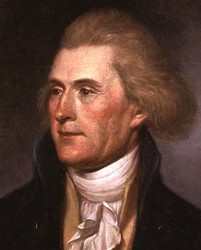Thomas Jefferson Views
|
| updated |
Copy Link Code
|
 In the personal opinion of Thomas Jefferson, political party affiliation was unnecessary and corrupting in a republican democracy that depended on a diversity of opinion and an ability to compromise as such. Yet it would not be long before Thomas Jefferson's political views showed that he was himself engaged in the sort of factionalism he had previously condemned. Drawn away by his duty as Minister to France during the Constitutional Convention, Jefferson resented the strongly Federalist revision to the original union of states under the Articles of Confederation. In the eyes of Thomas Jefferson, states' rights were paramount and the national government required specific limitations to prevent the accrual of absolute power. For the agrarian aristocrat Thomas Jefferson, strict constructionist interpretations dominated his reaction to the strong language of the Necessary and Proper Clause which gave the federal government the potential to develop enormous and unenumerated powers. The decision to give Thomas Jefferson, libertarian as he was, a position on the Cabinet of the Washington administration as the country's first Secretary of State would later be seen as a mistake when Jefferson joined James Madison in forming an anti-administration party in 1792. For the contentious Thomas Jefferson, politics hindered any chance at working with the Cabinet and he soon resigned in protest of Alexander Hamilton's fiscal policy that included plans for a national bank. Washington would never forgive Jefferson for his public displays of opposition and dissent.
In the personal opinion of Thomas Jefferson, political party affiliation was unnecessary and corrupting in a republican democracy that depended on a diversity of opinion and an ability to compromise as such. Yet it would not be long before Thomas Jefferson's political views showed that he was himself engaged in the sort of factionalism he had previously condemned. Drawn away by his duty as Minister to France during the Constitutional Convention, Jefferson resented the strongly Federalist revision to the original union of states under the Articles of Confederation. In the eyes of Thomas Jefferson, states' rights were paramount and the national government required specific limitations to prevent the accrual of absolute power. For the agrarian aristocrat Thomas Jefferson, strict constructionist interpretations dominated his reaction to the strong language of the Necessary and Proper Clause which gave the federal government the potential to develop enormous and unenumerated powers. The decision to give Thomas Jefferson, libertarian as he was, a position on the Cabinet of the Washington administration as the country's first Secretary of State would later be seen as a mistake when Jefferson joined James Madison in forming an anti-administration party in 1792. For the contentious Thomas Jefferson, politics hindered any chance at working with the Cabinet and he soon resigned in protest of Alexander Hamilton's fiscal policy that included plans for a national bank. Washington would never forgive Jefferson for his public displays of opposition and dissent.
Throughout the education and early political career of Thomas Jefferson, influences from the Enlightenment philosophers became very apparent. In the inspirational words of the Declaration of Independence as written by Thomas Jefferson, liberal theories of natural rights and equality were the most radical of assertions in a world of monarchs and nobility. For the young Thomas Jefferson, political beliefs were mostly formed in his studies at the College of William and Mary where he was mentored by the renowned professor Dr. William Small and later studied law under the eminent attorney George Wythe. In the earliest years of the political career of Thomas Jefferson, views on American self-governance were first demonstrated by his resolutions in the Virginia House of Burgesses that protested against the so-called Intolerable Acts passed by British Parliament. In the effort to lead the colonies into independence and unification, Jefferson worked well with many of the Founding Fathers who would later become his rivals. Despite the fundamental disagreements between Federalists such as Adams and Thomas Jefferson, political views that were opposed did not always prevent friendship.
The political party of Thomas Jefferson would share a name with a modern party, but did not directly lead to either of today's parties. Thomas Jefferson, Republican or Democrat? In later academic definitions he was Thomas Jefferson, Democratic-Republican but in the time of Thomas Jefferson, Republican Party was the commonly used title. For President Thomas Jefferson, party affiliations did not bar participation in his Cabinet and he retained many moderate Federalists in non-Cabinet level posts, withering away at support for the more extreme members of his opposition. The beliefs of Thomas Jefferson on democracy were focused on building a society in which such a political system would work most effectively. In the nightmares of Thomas Jefferson, tyranny would take root in a democracy dominated by the ruling class at its center. In modern terms, was Thomas Jefferson a Democrat? Was Thomas Jefferson a Republican? Any attempt to impose a modern party platform upon Thomas Jefferson, Democrat or Republican, would be moot and inaccurate at best.
